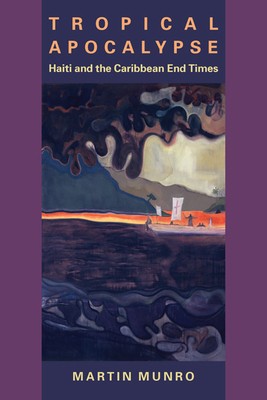
- We will send in 10–14 business days.
- Author: Martin Munro
- Publisher: University of Virginia Press
- ISBN-10: 0813938201
- ISBN-13: 9780813938202
- Format: 15.2 x 22.9 x 1.5 cm, softcover
- Language: English
- SAVE -10% with code: EXTRA
Reviews
Description
In Tropical Apocalypse, Martin Munro argues that since the earliest days of European colonization, Caribbean--and especially Haitian--history has been shaped by apocalyptic events so that the region has, in effect, been living for centuries in an end time without end. By engaging with the contemporary apocalyptic turn in Caribbean studies and lived reality, he not only provides important historical contextualization for a general understanding of apocalypse in the region but also offers an account of the state of Haitian society and culture in the decades before the 2010 earthquake. Inherently interdisciplinary, his work ranges widely through Caribbean and Haitian thought, historiography, political discourse, literature, film, religion, and ecocriticism in its exploration of whether culture in these various forms can shape the future of a country.
The author begins by situating the question of the Caribbean apocalypse in relation to broader, global narratives of the apocalyptic present, notably Slavoj iek's Living in the End Times. Tracing the evolution of apocalyptic thought in Caribbean literature from Negritude up to the present, he notes the changes from the early work of Aimé Césaire; through an anti-apocalyptic period in which writers such as Frantz Fanon, Antonio BenÃtez-Rojo, Ãdouard Glissant, and Michael Dash have placed more emphasis on lived experience and the interrelatedness of cultures and societies; to a contemporary stage in which versions of the apocalyptic reappear in the work of David Scott and Mark Anderson.
EXTRA 10 % discount with code: EXTRA
The promotion ends in 10d.07:51:58
The discount code is valid when purchasing from 10 €. Discounts do not stack.
- Author: Martin Munro
- Publisher: University of Virginia Press
- ISBN-10: 0813938201
- ISBN-13: 9780813938202
- Format: 15.2 x 22.9 x 1.5 cm, softcover
- Language: English English
In Tropical Apocalypse, Martin Munro argues that since the earliest days of European colonization, Caribbean--and especially Haitian--history has been shaped by apocalyptic events so that the region has, in effect, been living for centuries in an end time without end. By engaging with the contemporary apocalyptic turn in Caribbean studies and lived reality, he not only provides important historical contextualization for a general understanding of apocalypse in the region but also offers an account of the state of Haitian society and culture in the decades before the 2010 earthquake. Inherently interdisciplinary, his work ranges widely through Caribbean and Haitian thought, historiography, political discourse, literature, film, religion, and ecocriticism in its exploration of whether culture in these various forms can shape the future of a country.
The author begins by situating the question of the Caribbean apocalypse in relation to broader, global narratives of the apocalyptic present, notably Slavoj iek's Living in the End Times. Tracing the evolution of apocalyptic thought in Caribbean literature from Negritude up to the present, he notes the changes from the early work of Aimé Césaire; through an anti-apocalyptic period in which writers such as Frantz Fanon, Antonio BenÃtez-Rojo, Ãdouard Glissant, and Michael Dash have placed more emphasis on lived experience and the interrelatedness of cultures and societies; to a contemporary stage in which versions of the apocalyptic reappear in the work of David Scott and Mark Anderson.


Reviews